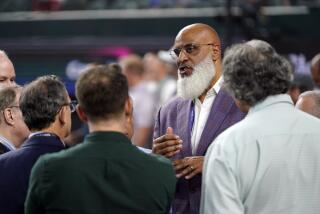Talks Go to 2 Fronts as Deadline Closes In
- Share via
NEW YORK — Formal talks resumed Saturday in the baseball contract dispute, but, with just three days remaining to the players’ strike deadline, no progress was reported.
“There were no new ideas suggested on the major issues today by either side,” said union leader Donald Fehr after two hours of discussions with owners’ representatives in the offices of a Manhattan law firm. It was the first such session since Wednesday.
The owners’ chief negotiator, Lee MacPhail, characterized the state of the talks, which have gone on nearly nine months, as “a temporary stalemate,” adding, “I don’t see anything in today’s meeting that particularly gets us closer together.”
Another meeting was scheduled for noon today. The two sides appear deadlocked on the owners’ proposals for a salary cap and new restrictions on salary arbitration, along with the players’ union demand for a fourfold increase--amounting to $45 million--in annual owner contributions to their pension fund.
As in the past, Commissioner Peter Ueberroth expressed a more optimistic view than the regular negotiators. “I was pleased that they are back at the table,” he said. “I have reason to be mildly encouraged. It would be wrong, it would be a shame, if we would have a third strike in a five-year period.”
He said he had talked to a number of players and owners Saturday and “I can’t find anybody that wants a strike.” So he expressed hope that “these professionals at the table . . . (will) get their jobs done.”
Ueberroth disclosed that he had held several discussions with key team owners in the last 24 hours without the presence of MacPhail. There have been reports of friction between Ueberroth and MacPhail.
But Ueberroth said that he has “no rabbits to pull out of a hat.”
“I’m going to do everything that I know how to do and use every ounce of energy,” he said, “but so must everyone else.”
The commissioner said nothing about the content of his talks with the four owners who constitute the owners’ negotiating counsel--Bud Selig of the Milwaukee Brewers, Peter O’Malley of the Dodgers, Edward Bennett Williams of the Baltimore Orioles and John McMullen of the Houston Astros.
Ueberroth was meeting separately in his office with Williams and Selig Saturday afternoon while the formal negotiating session was taking place two blocks away.
Afterward, there was the suggestion that the real negotiations might have been in Ueberroth’s meetings.
One of the union negotiators, Marvin Miller, said it is clear to him that Ueberroth is attempting to fashion with the owners a more realistic offer to make to the union, perhaps as late as Monday, just one day before the strike deadline.
But Miller said he fears that the offer will come too late and contain too little to allow a settlement without a strike.
Ueberroth, he remarked, strikes him as “an amateur” who does not really understand the nature of collective bargaining.
Despite such sharp comments, Miller--who was leader of the union during the 1981 strike and is now, along with Fehr, one of its principal negotiators--said he is not as certain there will be a strike as he was before the one in 1981.
Fehr and MacPhail, meanwhile, agreed that there remains time to resolve all the issues, provided someone makes a new offer that strikes the fancy of both sides.
Seven ideas sent by Ueberroth to both sides in writing Friday morning apparently have vanished without much trace. Fehr and MacPhail said the ideas were not directly discussed in the formal negotiating sessions Saturday.
Ueberroth declined substantive comment Saturday night when asked if he might try to use his commissioner’s powers “in the best interests of baseball” to impose a settlement on the owners that he had personally arrived at with the union.
MacPhail said: “He is working independently of us, and what he does, he does. If he does something, we will give consideration to it at that time.”
The question of Ueberroth’s power arises from a 1977 federal court decision upholding then-commissioner Bowie Kuhn’s order invalidating the sales by then-Oakland A’s owner Charlie Finley of Vida Blue, Rollie Fingers and Joe Rudi to other clubs on the grounds of the best interests of baseball. The court held that the commissioner’s power under that clause was virtually unlimited.
More to Read
Are you a true-blue fan?
Get our Dodgers Dugout newsletter for insights, news and much more.
You may occasionally receive promotional content from the Los Angeles Times.










